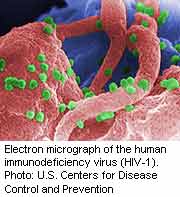
MONDAY, Feb. 28 (HealthDay News) — Preliminary research suggests that an HIV-fighting gel has the potential to become another weapon in the fight against AIDS when applied to the rectum before anal intercourse.
This is the first time scientists have found evidence that people would tolerate using a gel form of the commonly used AIDS drug tenofovir (Viread) in the rectum. However, there are caveats. The volunteers who tried the gel weren’t exposed to HIV and they didn’t like the treatment very much. There were side effects in some people, and there’s still more research needed to figure out whether the treatment is ready for release to the public.
“These are early results, but [they] help set the stage for current and future trials of rectal microbicides and the development of a rectal-specific formulation of tenofovir gel,” said Dr. Ian McGowan, a professor of medicine at the University of Pittsburgh who is leading a second-phase study of the gel. He made his comments in a news release from the Microbicide Trials Network, where McGowan is a co-principal investigator.
Researchers have focused on the use of microbicides — such as tenofovir — as a preventive treatment to be used in vaginal sex. However, scientists think unprotected anal sex is much more risky.
In the new study, the first of three phases needed before the treatment can get approval from the U.S. Food and Drug Administration, researchers tested tenofovir gel, the oral tenofovir pill and a placebo gel in 18 HIV-negative people who abstained from sex.
The investigators took small samples of cells from the rectums of the volunteers, and sent those to a lab where they were tested to see how they defended themselves against HIV, the virus that causes AIDS. A seven-day treatment with the gel performed the best; a single tenofovir pill didn’t have much effect at fighting HIV, they found.
“Most researchers believe the rectum is more difficult to protect from HIV than the vagina, so these findings demonstrating that it can be done will energize the search for a safe, effective and user-friendly rectal microbicide,” said Rowena Johnston, director of research at the Foundation for AIDS Research, who was not involved with the study. “These researchers have recognized that products like condoms or microbicides are only effective if people use them. Their plan to make what appears to be an effective product into a formulation people will want to use could be a winning combination.”
The findings were to be presented Monday at the Conference on Retroviruses and Opportunistic Infections in Boston.
Experts note that research presented at meetings has not been subjected to the same type of rigorous scrutiny given to research published in peer-reviewed medical journals.
More information
For more about HIV and AIDS, try the U.S. National Library of Medicine.

